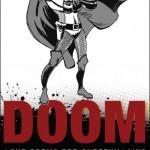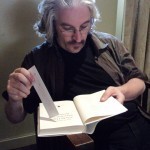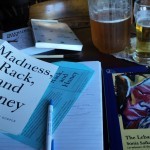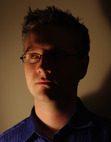Jonathan Ball's Blog, page 67
September 16, 2012
What are you working on right now, Natalie Zina Walschots?


My standard answer for “what are you working on right now?” is “everything,” but for the purposes of this project I will try to be a little more articulate.
For an entire year now, I have managed to support myself entirely via freelance writing. This means that I write all of the things all of the time. I have fixed columns for Canada Arts Connect, the This Magazine website, and Toronto Is Awesome, and am a regular contributor to Torontoist, Toronto Standard, About Heavy Metal, Angry Metal Guy, Hellbound and Exclaim!. I also have worth forthcoming in broken pencil and The National Post. I write about heavy metal, comics, video games, feminism, sadomasochism, arts and culture, video games, combat sport and local politics.
As my writing-to-eat career has grown, writing creatively has become more challenging. My second book of poetry, DOOM: Love Poems For Supervillains, is now out (published by Insomniac Press), and so I am regularly doing readings and interviews to promote it. I have started work on a series of poems that look at the intersection between heavy metal (the music) and heavy metals (the elements). I also started something that I intended to be a weird, magic-realist autobiography that is veering ever more into fiction, about a young woman in Windsor who becomes an illegal medic for people across the border who can’t afford medical care. She operates out of a massage parlour.
Natalie Zina Walschots is a music writer, poet and editor based in Toronto, Ontario. Once a scholarly, bookish young woman, she now spends the majority of her time permanently damaging her liver and her hearing at heavy metal shows. Natalie’s second book of poetry, DOOM: Love Poems For Supervillains, was published by Insomniac Press in the Spring of 2012. Her first book, Thumbscrews, won the Robert Kroetsch Award for Innovative Poetry and was published by Snare Books in the Fall of 2007. Natalie earned her MA in English Literature and Creative writing from the University of Calgary. Visit Natalie’s website and follow her twitter.
Winnipeg International Writers Festival
I’m making two scheduled appearances at THIN AIR, the Winnipeg International Writers Festival:
MANITOBA READS!
September 21, 2012 (8:00 – 10:30 pm)
Centre culturel franco-manitobain (CCFM), 340 boul. Provencher
Join me as I advocate on behalf of Struan Sinclair’s AUTOMATIC WORLD during this year’s Manitoba Reads debate.
MAINSTAGE: POETRY BASH!
September 28, 2012 (8:00 – 10:30 pm)
Shaw Performing Arts Centre (MTYP), The Forks
Join me alongside poets Lorna Crozier, Sue Goyette, Patrick Lane and JonArno Lawson.
Best review of The Politics of Knives yet
Jonathan Ball’s new book is shitballz hecka good.
— Jacob McArthur Mooney
September 15, 2012
THIS review
THIS magazine ran a great mini-review (more of a blurb) for The Politics of Knives:
If Jonathan Ball’s previous book of poems Clockfire was a book about the horrors of the theatre, The Politics of Knives, his most recent, is about the horrors of film. Using the cut as an organizing device, Ball interrogates the way we organize our everyday (and not so everyday) narratives: how we surveil and are surveilled, what we include and exclude from our cinematic and psychological frames, and what it means to wait for the next reel to start. Caught between filmic edit and horrific cuts in reality, Ball asks whether the imagined film of our lives isn’t already a scary one. (Ryan Fitzpatrick)
September 13, 2012
Douglas Barbour reviews The Politics of Knives
A wonderful, insightful review of The Politics of Knives just appeared on Douglas Barbour’s website. An excerpt:
The Politics of Knives marks Jonathan Ball as a talent already here in a big way. Read it.
Barbour previously wrote a stellar review of Clockfire that is worth checking out as well.
What are you working on right now, Brenda Schmidt?
Well, I’m about to blow up my poetry manuscript. I worked on it in a poetry colloquium at the Sage Hill Writing Experience in 2010 and it’s ready enough to send out to a publisher, but I’ve held back for some reason. This spring I reviewed the project proposal for the book and realized the manuscript had become something else. I think I might have a better sense of what it’s about now. It has a plot of sorts, so there might be a novel buried in it. There might be a nonfiction book in it, too. To find out, I plan to use the manuscript as a chapter outline; each poem will serve as a chapter description. I’ll set some rules to push against for fun, blow the thing up and see what happens.
Brenda Schmidt’s fourth book of poetry Grid was published by Hagios Press in spring 2012. Flight Calls: An Apprentice on the Art of Listening, her book of essays, was published soon after by Kalamalka Press as part of the Mackie Lecture and Reading Series.
September 10, 2012
In which I attempt to be “a gentleman [writer] and a scholar”
Republishing an old article I produced in 2010. Since a new school year just began, I’m sure there are plenty of new graduate students who are also creative writers, and struggling to determine how to balance their studies and their writing. Here’s my advice.
Recently, I received an e-mail from a self-described “budding author” that required some thinking before I could give a proper response. I’m giving my answer here, since one of my goals for this site redesign is to make the site more useful to my students, and I daresay that my response might be helpful.
The basic question concerns going to do an MA (with an academic focus, not a creative thesis) yet also wanting to remain a creative writer. How to focus on creative work and academic work at the same time? How to be a writer and a scholar at once?
It’s a good question. I’m going to try to give a good answer, and to do so I’m going to break the question up and tackle its aspects in isolation.
Set Clear, Attainable Goals.
First, like anything else, it’s important to set goals that are clear and attainable. “Publish my first novel” is a perfect example of a bad goal, as is “Complete my MA.” A better goal is “Complete final polish on my first novel manuscript before the world ends on Dec. 20, 2012″ or “Defend my MA thesis before I get married on Jan. 15, 2013.”
These goals are more specific, they are measurable (you know when you’ve completed them), they are attainable (“publishing” isn’t “attainable” in the sense that it relies on an outside party — all meaningful goals should be possible to accomplish without the intercession of others), they’re realistic (in theory; of course this depends on other, personal factors, and whether the timeline makes sense when taking them into account), and they are time-sensitive (there’s a date attached, it’s not just a vague thing).
My goals going into my Ph.D. were simple:
– complete all of my course work in the first eight months
– complete each stage of the program as fast as possible (I set additional, specific timeline goals for each stage)
– graduate within four years
– apply for every grant that I’m eligible for and aware of (grant deadlines are obviously time-sensitive)
– complete a draft of a novel as my thesis, so that I have a working draft to edit when I graduate
– complete a book of poetry and submit it to publishers before I graduate (in this instance, and the next, my timeline was determined by the “graduate within four years rule)
– complete and submit at least three essays to academic journals (at least one refereed)
Notice that my goals are both creative and academic.
Having clear goals helped me immensely. Not only did I accomplish them all, but in fact I completed five poetry book manuscripts (some of them I’d already started before the program began). Two were under contract to be published before I graduated. (One I redesigned later as The Politics of Knives, and two I trashed.)
Note that I didn’t set a goal to publish anything. You can’t control whether or not somebody accepts your work for publication, and even if they do accept it, you can’t control when they publish. All my goals were to “complete and submit.” Even if I’d published nothing, I would have met these goals. However, I was determined to publish, so I kept “submit” in my goals.
Now I will tell you the deep, dark secret of graduate school. A simple rule you MUST follow if you plan to go to graduate school as a writer or even just to teach.
Remember that nobody cares about your grades. Getting good grades is your least important concern.
Are you shocked? You shouldn’t be. Remember that it’s NOT an UNimportant concern. It’s important, but of the least importance. In other words: Getting As is the bare minimum.
Everyone else will get As. You’d better get them too. But if you spend all your time trying to do well in class and get As, then you are wasting your time.
What you need to do is set yourself apart, without being aggressive or a competitive jerk. What people care about, when you enter the so-called “real world” after graduate school, is PUBLICATIONS, AWARDS, and EXPERIENCE.
Everyone has As. Everyone passed. You’re all brilliant. But who’s actually done something? If you don’t do anything outside of graduate school, you look like a total loser to a potential employer AND you’ve been putting your life on hold for no payoff. Which leads me to remark:
Don’t put your life on hold.
There are no substantial rewards after graduate school. The jobs are scarce, the jobs don’t pay well (for the education you actually have and the time you put in), and you don’t get the respect you deserve. Even from your Mom.
Moreover, putting your life on hold is a great way to look myopic and like you can’t manage your time properly. If you can’t get through grad school without having time for outside activities, then how can you possibly teach a full course load AND conduct research?
When I hear “I can’t imagine forgetting about my novel for a year!” I shudder. This is exactly the kind of thinking that is foisted on people. “You must put all aside and focus on your studies!” saith the dean. But I will say it again: I wrote SIX BOOKS in first draft (two in final draft) including my thesis, AND finished on time. And I’m not that special. The reality is this:
Completing your novel, instead of putting it on hold, is the most important thing you could do for your future career.
If your novel IS your thesis (i.e., if you’re doing the creative thesis option), then I would hope that this would be obvious. But even if it’s not, as in this example, even if you’re doing an academic thesis, then your novel is STILL the most important thing.
Why? Because everybody else is also going to have a completed thesis when they are done. Because everybody else has As. Because everybody else got award X or scholarship Y. Everybody else is going to publish in at least one refereed journal (and it goes without saying that you’d better submit work to journals, along with getting As and winning awards).
How can you set yourself apart? Not by competing in-class to prove your intellectual superiority. You’ll look like a jerk and people will shun you. Not by getting an extra RA or TA job. Everyone else did that. But who else is completing and (hopefully) publishing a book? Or a schwack of essays?
Almost nobody. When people look at my CV, they are impressed by precisely three things: (1) I got a SSHRC Doctoral Fellowship, (2) I have a book published and another forthcoming this fall, and (3) it’s 10 pages long in the short version, and I’ve only been out of school one year. (There are unimpressive aspects of my CV, but I’d be a fool to broadcast them.)
Besides, they are hiring people, not pages. Who’d you rather hire, somebody who has been hell-bent on graduate school to the expense of having a personality, or somebody who managed to tag all the bases including drafting up a strong thesis, AND managed to craft a novel? Who sounds more interesting, more organized, more capable, and more fun to chat with in the common room?
Nobody is impressed by my transcript with all its As and A+s and awards, aside from seeing the SSHRC on there. It looks just like everybody else’s transcript. Except, maybe, that I completed my studies on time.
Complete the program on time, and as fast as you can.
There’s a lot of bullshit competitiveness in grad school. Sidestep it all. Be nice to people and make friends. And quietly complete the program as fast as you can, faster than your peers.
You’re not struggling against them, you’re struggling with them, and against yourself. Nobody cares about your grades, unless they are low. Not even the department you’re in. What do they care about? They care about how far along you are in the program.
When they have money to give out, they give it to the person who’s the farthest along in the program, barring something specific that must be taken into account. If you just do things quickly, you’ll be competitive without having to compete, and thus without having to start any turf wars or feuds or other nonsense.
When I was done, my thesis needed a lot more work. I’m slowly doing that work now. I could have done it earlier, but the goal isn’t to craft a perfect, publishable thesis. Your goal is this:
Craft a workable, defensible thesis — then get the hell out of there!
Polish and rewrite and get the thesis perfect and publishable on your own time. You’re getting a degree, not publishing a book. The longer you stay in the program, the worse you look to an outside observer.
Nobody expects you to get your book accepted the moment you’ve graduated. They expect you will have to rewrite it anyway, and “get the dissertation out” before it’s publishable. They had to rewrite their dissertations, why shouldn’t you?
I know I was asked about an MA program, but I talked about my doctoral studies because the answer’s still relevant, and is also now relevant to readers thinking about the PhD. That’s an overview of my general advice regarding graduate school. How about specific answers and comments?
“Did you feel like you were compromising your creativity?”
No. I was careful. I minored in literary theory, which is broadly useful in academia and also of use and interest in a personal approach to writing. And I majored in Canadian literature, which helped me get a sense of where there was a gap in the literature of this country and where I might attempt to find a niche as a writer myself. For me, this made sense and fed my interests; another writer might justify another field in another way.
If you’re going to have two careers, you need to make them complement each other. It’s hard enough to have a single career. You don’t need the hassle of a second one. You have to find a way to merge them and to view/sell your creative work as an asset and a branch of your research (without crafting boring, theory-heavy books).
I didn’t do ANYTHING in graduate school unless I felt that it was going to help me as a writer in some way. Or improve my teaching abilities (because I love teaching and think it’s important to teach). And I made the time to write, regardless of how busy I was, even if I only wrote for 10 minutes.
So though I often bemoaned my lack of time, as I continue to do now, I was still slowly progressing on both creative projects and academic ones. Where I DID compromise too much was in not doing the creative thesis option immediately.
I entered the program with an academic thesis and held onto it for almost a year. It was a mistake. I should have jumped in. It would have saved me a lot of time and trouble. Not because writers should always do creative theses, but because my academic thesis was a worse idea. You should just go with the best idea, whether academic or creative. Your most impressive project should be your thesis. Your second-best project can be your secondary focus. It sounds obvious but it’s not always obvious when you’re on the inside.
“I’m learning increasingly that writing is not only about talent, but mental perseverance, time management, organization…”
Hallelujah! This is, to my mind, the biggest misconception about art in general — that you don’t need to be organized, persistent, or efficient … just “talented.” Whatever that means.
Whoever told me that “Hard work is more important than talent” was right (it was either Maurice Mierau or David Bergen).
“[What about] negotiating between the writing mind and the scholarly … not only the varying mental spaces, but also how to go about establishing a routine that can accommodate both…”
It’s hard, but for me it’s not the transitioning that’s hard. It’s the “only so many hours in a day” thing that’s difficult. I struggled with this then, and I still do, but even though it’s hard, the answer is simple: you have to prioritize BOTH.
(And, as noted above, you need to think of your writing as a branch of your broader research and think/plan/work accordingly, without getting into a headspace where you end up producing clunky, academic fiction.)
You should, to my mind, always have four projects on the go. A LONG CREATIVE project, a SHORT CREATIVE project, a LONG ACADEMIC project, and SHORT ACADEMIC project. The LONG projects are your top priorities, even if they are not urgent and have no deadlines, and even if the short projects are urgent and do have deadlines. (This ability to focus on important, non-urgent projects without ignoring more urgent matters is essential to long-term success.)
Then, every day, try to take one concrete step towards completing these projects. I define a concrete step as reading X pages or writing X words. So, right now, this is how I’m working. Here are my current projects [I revised this part so here are my current, Sept. 2012 projects]:
LC – The Lightning of Possible Storms (a short story book)
SC – A short story within said book, “Explosions”
LA – John Paizs’ Crime Wave (academic monograph book, in revision stages)
SA – Book review of Deluded Your Sailors by Michelle Butler Hallett
Every day, I produce at least 500 words on one of these books (since I have fast-approaching deadlines for the academic book, I’m focused on that), and if possible I do more (a lot more if I can). Then I work on a short work (whatever has the earliest deadline), completing some predefined task (today, I will read at least 50 pages of the Hallett book).
In other words, I insist on having CLEAR PRIORITIES and PRE-DEFINED PROJECTS and DAILY QUOTAS. I try to do more. But I focus on not doing less.
Even if I feel like garbage. Even if you write nonsense you’ll have to later delete, it’s better than writing nothing. It helps you think and it helps you build discipline and it helps to practice. And if you write a single usable sentence in that 500 lousy words, then you’ve done more than if you put it off until tomorrow when you’ll supposedly have more time or feel refreshed.
Also, importantly,
Don’t get trapped into reading/researching when you should be writing.
You need to do both. But your reading and research should not get in the way of your writing. Even if you are doing preliminary reading/research to prepare an essay, you should be writing a different essay or writing notes AS YOU READ. It will be easy (ha!) because you will:
Write according to a schedule.
Studies have shown, time and again, that if you do the same kind of writing at the same time, daily, even if only for a small window of time (like 20 minutes), you will be much more productive (like, produce 3-5 times as many pages) than if you write in large yet irregular blocks (writing like this, people tend to only write slightly more than “controls” told to write NOTHING that they don’t HAVE to write).
That’s my advice. The most important thing to do if you plan to be a writer and a scholar is to remember that AND. You have to commit to BOTH.
You don’t put one on hold while you work on the other. Trust that your success in one area will feed into the other — I’ve been hired to teach creative writing courses based solely on my publication record — and get yourself organized, get disciplined, and work efficiently.
Commit yourself and treat both your studies and your writing as a job. Clock in at 9, clock out at 5, or whatever, and work sensibly.
Most other so-called writers and scholars will work when they “find the time” or when “inspiration strikes.” You have to make the time and manufacture inspiration.
Hope this helps.
September 9, 2012
Avant-Garde Basketball Player Penalized for Travelling
The avant-garde artist known only as “Dehzi,” who has become infamous for his unorthodox contributions to professional sports, was penalized for travelling in a basketball game on friday.
During the game’s first period, Dehzi gained possession of the ball after intercepting a pass. Dehzi then ran around the court in a ever-widening spiral, screeching tonelessly and holding the ball over his head. Dehzi continued this behaviour when game play had stopped due to the penalty call, ceasing only after being tripped by a member of his own team.
Reaction to the work has been divided. While some critics hailed the play as “revolutionary” and derided the game’s referee as “a philistine,” other critics declared Dehzi’s most recent play “pointless, annoying, and derivative of his previous work.”
Dehzi declined comment, but the team’s coach, James O’Halloran, issued a statement to the press earlier today. “In his playing, Dehzi tries to strip basketball down to its core elements, and engage with the game on a pre-linguistic level,” said O’Halloran. “He’s really got to cool it with that shit.”
September 8, 2012
What are you working on right now, rob mclennan?
Anytime people call me productive, I scoff and point to rob mclennan….
[image error] [image error]



Although I tend to write rather quickly, my projects tend to last months, if not years. Some of the main ones I’m in the midst of these days include a second collection of short stories, a wedding essay, a fourth novel, a memoir and a collection or two of poetry. And of course, the constant stream of reviews and short essays that never seem to clear entirely off my plate.
After five or so years, I managed to send out a collection of short short stories out to publishers last fall, and have since started a collection of stories that each run about three pages in length. Over the past seven months, I’ve started nearly a dozen, and so far have completed five that I think I might even be pleased with. The bulk of my prose work over the past couple of years is less a matter of adding lines than removing or altering words, boiling the prose down as much as possible. It’s a long, tedious process. The manuscript for a third novel has been making the rounds for about a year, and I’ve been buried underneath a fourth, a reworking of Don Quixote I’ve been dipping into since New Year’s Eve, 2007 (an essay I wrote on Don Quixote appeared online last year in Rain Taxi). I’ve been working to focus more of my attention to Don Quixote since last fall (after having completed a number of other projects), but it still goes far slower than I’d like. It’s a big thing to wrap my head around. In my mind, the entire novel is about perception, and that’s something I’m very much interested in. Some projects take their own time, it would seem. I’m also two years into my post-mother creative non-fiction project, “The Last Good Year,” being mere days past two years since my mother died. I’ve been posting fragments on the blog as work progresses. Some days it progresses quickly, and other days it cuts too deep, and I have to put it aside.
Really, the biggest thing I’ve been working on these days is the wedding: Christine McNair and I are to be married on September 29, 2012, which is entirely distracting (in a good way). It’s been in the planning stages long enough (since our engagement at the end of last November) that I think there’s a part of each of us anticipating the day itself, so we can move on to whatever comes next. Since the engagement, I’ve also been working on a lengthy creative non-fiction essay on wedding traditions, contemporary poetry, the epithalamium and fragments of memoir (so far titled “Notes on (a) Marriage: epithalamium – an essay in eleven parts –”), as well as occasionally dipping into a poetry manuscript that incorporates elements of the engagement/upcoming wedding and my father’s recent (second) cancer scare, a collection of prose poems titled “Life sentence” (I’m fully aware that Eli Mandel also used the title, and am working to incorporate small elements of his into mine).
I also recently completed a couple of essays on the prose poem – focusing on American poets Norma Cole and Lisa Jarnot – which most likely conclude a collection of essays I’ve been adding to over the past couple of years (although I’m not really sure what I’m supposed to be doing with the manuscript, since literary essays at best are a difficult sell). I’ve been very taken with ideas of the poetic sentence and the prose poem over the past couple of years, and the form has been steadily creeping further into all of my projects, it seems. I think I’m working my way up to a lengthy essay on the Canadian prose poem, very distant from its American cousin that I haven’t yet figured out the hows or the whys. Perhaps over the coming months it might clarify.
I’ve also been spending much of the summer preparing boxes of literary archive for the University of Calgary, having sent off some thirty-plus boxes so far. I’ve re-discovered a number of things I’d managed to forget, over time. There is far too much paper in our small apartment. I’ve still a long way to go.
Ottawa ON
August 23, 2012
***
Born in Ottawa, Canada’s glorious capital city, rob mclennan currently lives in Ottawa. The author of more than twenty trade books of poetry, fiction and non-fiction, his most recent titles are the poetry collections Songs for little sleep, (Obvious Epiphanies, 2012), grief notes: (BlazeVOX [books], 2012), A (short) history of l. (BuschekBooks, 2011), Glengarry (Talonbooks, 2011) and kate street (Moira, 2011), and a second novel, missing persons (2009). An editor and publisher, he runs above/ground press (which recently celebrated nineteen years), Chaudiere Books (with Jennifer Mulligan), The Garneau Review (ottawater.com/garneaureview), seventeen seconds: a journal of poetry and poetics (ottawater.com/seventeenseconds) and the Ottawa poetry pdf annual ottawater (ottawater.com). He is also the co-founder and organizer of the ottawa small press book fair, which celebrates eighteen years this fall. He spent the 2007-8 academic year in Edmonton as writer-in-residence at the University of Alberta, and regularly posts reviews, essays, interviews and other notices at robmclennan.blogspot.com
What are you working on right now, Maurice Mierau?
I’m writing an essay for Contemporary Verse 2 (winter 2013 issue) about some poets I’ve spent time reading recently, including (if there’s space), Don Paterson, Linda Besner, & Patrick Friesen. There’ll also be a new poem from my new collection, Six, which I hope to finish revising before I’m dead.
Also am looking for a bookish editor willing to take an essay about Tim Bowling’s amazing memoir from 2010, In the Suicide’s Library, which Tim tells me was never reviewed in Canada (depressing, surprising, unsurprising). It’s about Weldon Kees and bibliomania and being a dad and worrying about the end of the world while obsessing about poetry. Fantastic stuff. And since it’s a Gaspereau book, it’s gorgeous.
I finished a memoir in January about adopting my 2 youngest sons in Ukraine, my father’s traumatic childhood in Soviet Ukraine, and about me learning to be a semi-competent dad & son. Am now shopping it to publishers.
I continue to edit The Winnipeg Review, a lit zine; am preparing the fall issue, due out around Sept 17, right now. TWR got a small Canada Council grant this summer, which will help us survive. One of Patricia Young’s poems that I published last year recently appeared in the 2012 Best Canadian Poetry in English.
Then the books I edited this spring for Enfield & Wizenty are coming off the press. Méira Cook’s debut novel, The House on Sugarbush Road, was the first to ship. I’ll introduce Cook at the McNally Robinson launch in Winnipeg on Sept. 10. The novel is brilliant, sensual, set in 1990s South Africa with a Balzacian cast of characters. The book looks pretty damn good too (thank you Relish).



